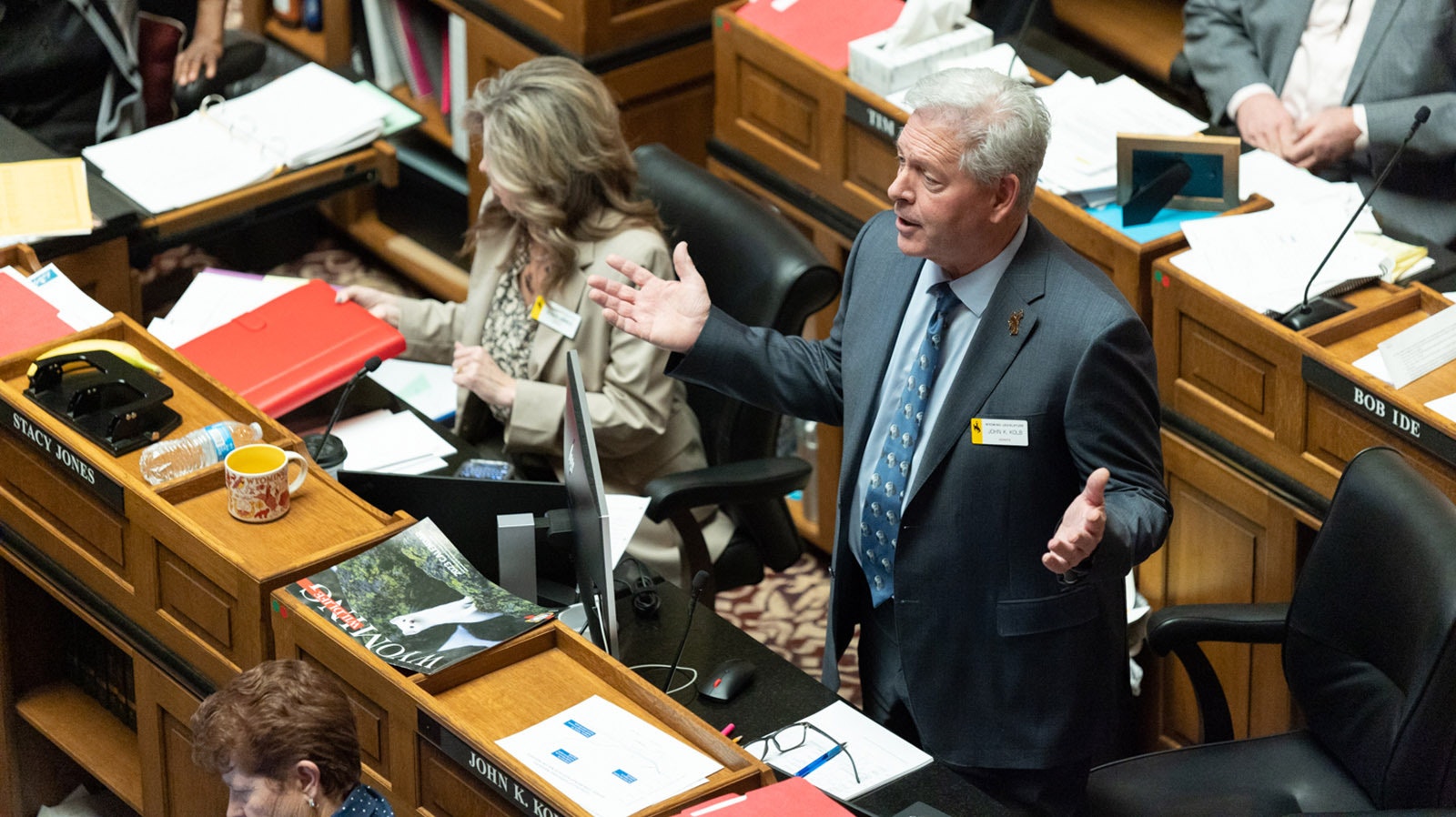A bill originally intended to support Wyoming’s suicide call centers in perpetuity with a dedicated trust fund has been amended to do almost the opposite.
An amendment to House Bill 65 from state Sen. John Kolb, R-Rock Springs, puts a 2028 expiration date on the trust fund that was proposed to support the call centers. Lawmakers already have stripped the $46 million originally proposed to seed the trust fund.
Kolb said there needs to be a deadline to test the effectiveness of the 24/7 call centers in reducing the suicide rate in Wyoming, which is the highest per capita in the nation.
“It’s merely about looking at something and evaluating it,” Kolb said. “To re-evaluate it is good.”

Already Working
Andi Summerville, executive director for the Wyoming Association of Mental Health and Substance Abuse Centers, said the call centers have already positively impacted the state’s suicide rate.
Preliminary numbers show that suicides dropped by about 20% last year after a slight decrease in 2021 as well.
“I feel like that concern has been addressed,” she said in response to Kolb’s concern. “It’s been well-researched and the effectiveness has been shown.”
A handful of senators also spoke against the amendment, saying it creates too short of a deadline and no guidance to effectively study the impact of the call centers, and it puts a price on people’s lives.
“It looks to me like we’re putting a value on human life,” said Sen. Ed Cooper, R-Ten Sleep. “If we save one life, I think it’s worth it. We should keep it going however long it takes to make the problem better.”
Sen. Affie Ellis, R-Cheyenne, mentioned how when Colorado ended its poison control hotline then re-started it a few years later, it took a long time to get calls back up to their previous volume.
“If we don’t provide long-term security, those calls just get shifted to some other places,” she said.
The amendment passed on a 16-15 vote.
What’s Left?
The state’s two 988 suicide call centers are funded with mostly federal COVID-19 relief money.
Aside from a $400,000 allotment from the state’s general fund, the centers in 2022 upgraded to 24/7 service based on a two-year allocation of $2.1 million in American Rescue Plan Act money.
The call centers only have guaranteed funding for the next two years from the state and federal government.
Under an amendment that was made to HB 65 earlier in the legislative session, the Wyoming Department of Health will be responsible for proposing a budget request for the call centers next fall for the 2024 biennium that begins in 2025.
Rep. Landon Brown, R-Cheyenne, told Cowboy State Daily last month that he expects the overall funding for the call centers to increase to a $1.5 million to $2 million every two years.
“I guarantee we’ll be talking about appropriations from the state in the not-so-distant future to fully fund this program,” said Sen. Bo Biteman, R-Ranchester, who supported Kolb’s amendment.
No Action
Sen. Chris Rothfuss, D-Laramie, said the Legislature only has itself to blame for Wyoming’s high suicide rate, too focused on looking for the perfect solution to a growing problem.
“We really haven’t taken action over the last decade,” he said. “We study things, we take a look, we consider, we try to work through … we’re reticent, and we have been reticent for certainly as long as I’ve been in the Legislature when it comes to this challenging issue.
“It’s almost like we’re frozen because we want to do the right thing.”
Although $250,000 has been given to Wyoming from the federal government for the program this year, President Joe Biden’s administration has announced it is increasing support by $408 million for suicide call centers around the nation.
It has not been announced whether Wyoming will receive any of that money.
Department Of Health To Become Fundraisers?
The two call centers were first established in 2020 with limited hours of service with $250,000 of seed money from the state.
The original intent of HB 65 was to create a trust fund with $46 million to support the call centers permanently. All the money was slashed from the bill in its second reading in the House, but Brown added an amendment to create the trust fund with a $0 balance.
The purpose of creating the trust fund with no money was to allow the public to donate to it.
On Wednesday, language also was added saying the Department of Health should make “reasonable efforts to secure donations to support” the trust fund from charitable foundations and other organizations.
Summerville said she has never seen a sunset date put on a mental health program or employees of a state program being charged with funding themselves before.
“What we started with in the original bill not only codified the programs and the importance of having suicide call centers in Wyoming, but permanently funded them, to where we are now, it’s really interesting,” Summerville said.
Close To Being Law
Despite changes she finds less than favorable, Summerville said she understands the reservation felt by some lawmakers to create a new government program.
She still supports the bill and sees it as a positive development for suicide prevention in Wyoming.
“To have this fully funded would be a huge landmark piece of legislation,” she said. “It just means we have a little more work to do moving forward.”
On Wednesday, HB 65 passed the Senate on its third reading. It will next move to the House for concurrence before it can be sent to Gov. Mark Gordon’s desk to be signed into law.





